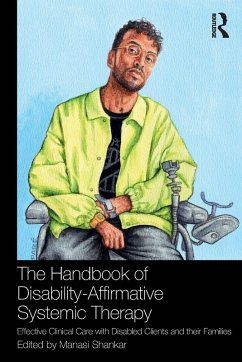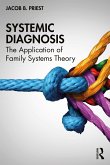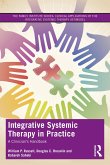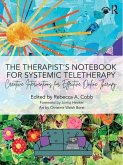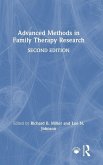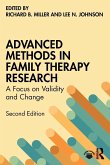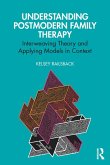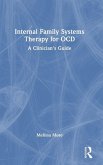The Handbook of Disability-Affirmative Systemic Therapy
Effective Clinical Care with Disabled Clients and their Families
Herausgeber: Shankar, Manasi
The Handbook of Disability-Affirmative Systemic Therapy
Effective Clinical Care with Disabled Clients and their Families
Herausgeber: Shankar, Manasi
- Broschiertes Buch
- Merkliste
- Auf die Merkliste
- Bewerten Bewerten
- Teilen
- Produkt teilen
- Produkterinnerung
- Produkterinnerung
This comprehensive handbook provides therapists, social workers, educators, and mental health professionals with effective clinical interventions for working affirmatively with disabled clients and their families.
Andere Kunden interessierten sich auch für
![Systemic Diagnosis Systemic Diagnosis]() Jacob B. PriestSystemic Diagnosis41,99 €
Jacob B. PriestSystemic Diagnosis41,99 €![Integrative Systemic Therapy in Practice Integrative Systemic Therapy in Practice]() William P. RussellIntegrative Systemic Therapy in Practice36,99 €
William P. RussellIntegrative Systemic Therapy in Practice36,99 €![The Therapist's Notebook for Systemic Teletherapy The Therapist's Notebook for Systemic Teletherapy]() The Therapist's Notebook for Systemic Teletherapy34,99 €
The Therapist's Notebook for Systemic Teletherapy34,99 €![Advanced Methods in Family Therapy Research Advanced Methods in Family Therapy Research]() Advanced Methods in Family Therapy Research171,99 €
Advanced Methods in Family Therapy Research171,99 €![Advanced Methods in Family Therapy Research Advanced Methods in Family Therapy Research]() Advanced Methods in Family Therapy Research59,99 €
Advanced Methods in Family Therapy Research59,99 €![Understanding Postmodern Family Therapy Understanding Postmodern Family Therapy]() Kelsey RailsbackUnderstanding Postmodern Family Therapy52,99 €
Kelsey RailsbackUnderstanding Postmodern Family Therapy52,99 €![Internal Family Systems Therapy for OCD Internal Family Systems Therapy for OCD]() Melissa MoseInternal Family Systems Therapy for OCD185,99 €
Melissa MoseInternal Family Systems Therapy for OCD185,99 €-
-
-
This comprehensive handbook provides therapists, social workers, educators, and mental health professionals with effective clinical interventions for working affirmatively with disabled clients and their families.
Produktdetails
- Produktdetails
- Verlag: Taylor & Francis Ltd
- Seitenzahl: 346
- Erscheinungstermin: 13. November 2025
- Englisch
- Abmessung: 229mm x 152mm x 19mm
- Gewicht: 502g
- ISBN-13: 9781032423869
- ISBN-10: 1032423862
- Artikelnr.: 74775023
- Herstellerkennzeichnung
- Libri GmbH
- Europaallee 1
- 36244 Bad Hersfeld
- gpsr@libri.de
- Verlag: Taylor & Francis Ltd
- Seitenzahl: 346
- Erscheinungstermin: 13. November 2025
- Englisch
- Abmessung: 229mm x 152mm x 19mm
- Gewicht: 502g
- ISBN-13: 9781032423869
- ISBN-10: 1032423862
- Artikelnr.: 74775023
- Herstellerkennzeichnung
- Libri GmbH
- Europaallee 1
- 36244 Bad Hersfeld
- gpsr@libri.de
Manasi Shankar, Ph.D., is a clinician, educator, and scholar who specializes in disability-affirmative systemic therapy. She is the founder of Therapy at Bay - a private practice based in the San Francisco Bay area - and provides national and international training on systemic therapy with disabled clients and families.
Section I: History
Law & the Sociopolitical Context of Disability 1. "he printed his name with his right hand *" Steven T. Licardi
LCSW 2. An Overview of the History of Disability in the United States Megan C. Carlos
Ph.D. 3. Disability and the Law: Challenges and Opportunities in the U.S. Legal System Solomon Furious Worlds
J.D. and Ellis Scout Cliff 4. Human Variation: Disability Models Explained Angélica Guevara
Ph.D. 5. Ableism within Academia: Impact on the Lives of Disabled Persons Rhoda Olkin
Ph.D. Section II: Contextualizing Disability Through an Intersectional Lens 6. "Total Blindness" Catlin Hernandez 7. The Intersection of Older Adulthood
Mental Health
and Disability Pamela B. Teaster
Ph.D.
and Onyinye F Mbanefo
M.S. 8. The Intersection of Race and Disability: Redefining Inclusive Therapeutic Practice Angélica Guevara
Ph.D. 9. Intersecting Identities: Supporting 2SLGBTQ+ Disabled People Alan Santinele Martino
Ph.D.
Melissa Miller
Jordan Parks
and Eleni Moumos Section III: Foundations of Disability-Affirmative Therapy 10. "Becoming Dyslexic" Catherine Kapphahn 11. Thinking Psychoanalytically about Therapy with Disabled People: The Need to Begin with Ourselves Brian Watermeyer
Ph.D. 12. The Counteractive Value of Disability Affirmative Therapy: How Well-meaning Assumptions ("I don't see disability") Impacts Disabled Clients Katy Evans and Mel Halacre Kami L. Gallus Ph.D.
LMFT
Jennifer L. Jones
Ph.D.
Garrett M. Jones
and Natalie M. Richardson
Ph.D.
LMFT 14. Couples Therapy with Disabled Partners: Integrating Disability into Relational Practice Rebecca Kammes
Ph.D.
LMFT
Madeline Barger
LMFT
and Debra L. Miller
Ph.D.
LCSW 15. Disability-Affirmative Family Therapy (Part I): Historical Foundations and Philosophical Assumptions Manasi Shankar
Ph.D.
LPCC
NCC 16. Disability-Affirmative Family Therapy (Part II): Clinical Applications Manasi Shankar
Ph.D.
LPCC
NCC 17. Accessible Therapy Spaces: Looking Beyond Infrastructure Toni Saia
Ph.D.
CRC and Gabrielle Ficchi Ph.D.
LPC
LPCS
CRC Section IV: Clinical Supervision and Program Development 18. "I am." Pramod Shankar 19. Addressing The Missing Piece: Developing Inclusive Programmatic Structures
Modules
and Coursework Brittany A. Williams
Ph.D.
LCPC
NCC
Derek
X. Seward
Ph.D.
LMHC
NCC
and Kahyen Shin 20. Multi-disciplinary Collaboration
Representation
and Ethical Research of Disability Experiences Lydia Qualls
Ph.D.
Lyndon Frommer
and Ashley Shew
Ph.D. 21. Clinical Supervision of Disability-Specific Cases Shakeela Gray
LGPC
NCC
Brittany A. Williams Ph.D.
LCPC
NCC
and Briana Gaines
Ph.D.
LPC
CCTP 22. Disability Justice and the Person-of-the-Therapist Framework James Tillett
Ph.D.
Jody Russon
Ph.D.
and Shalini Srinivasan
M.A.
Law & the Sociopolitical Context of Disability 1. "he printed his name with his right hand *" Steven T. Licardi
LCSW 2. An Overview of the History of Disability in the United States Megan C. Carlos
Ph.D. 3. Disability and the Law: Challenges and Opportunities in the U.S. Legal System Solomon Furious Worlds
J.D. and Ellis Scout Cliff 4. Human Variation: Disability Models Explained Angélica Guevara
Ph.D. 5. Ableism within Academia: Impact on the Lives of Disabled Persons Rhoda Olkin
Ph.D. Section II: Contextualizing Disability Through an Intersectional Lens 6. "Total Blindness" Catlin Hernandez 7. The Intersection of Older Adulthood
Mental Health
and Disability Pamela B. Teaster
Ph.D.
and Onyinye F Mbanefo
M.S. 8. The Intersection of Race and Disability: Redefining Inclusive Therapeutic Practice Angélica Guevara
Ph.D. 9. Intersecting Identities: Supporting 2SLGBTQ+ Disabled People Alan Santinele Martino
Ph.D.
Melissa Miller
Jordan Parks
and Eleni Moumos Section III: Foundations of Disability-Affirmative Therapy 10. "Becoming Dyslexic" Catherine Kapphahn 11. Thinking Psychoanalytically about Therapy with Disabled People: The Need to Begin with Ourselves Brian Watermeyer
Ph.D. 12. The Counteractive Value of Disability Affirmative Therapy: How Well-meaning Assumptions ("I don't see disability") Impacts Disabled Clients Katy Evans and Mel Halacre Kami L. Gallus Ph.D.
LMFT
Jennifer L. Jones
Ph.D.
Garrett M. Jones
and Natalie M. Richardson
Ph.D.
LMFT 14. Couples Therapy with Disabled Partners: Integrating Disability into Relational Practice Rebecca Kammes
Ph.D.
LMFT
Madeline Barger
LMFT
and Debra L. Miller
Ph.D.
LCSW 15. Disability-Affirmative Family Therapy (Part I): Historical Foundations and Philosophical Assumptions Manasi Shankar
Ph.D.
LPCC
NCC 16. Disability-Affirmative Family Therapy (Part II): Clinical Applications Manasi Shankar
Ph.D.
LPCC
NCC 17. Accessible Therapy Spaces: Looking Beyond Infrastructure Toni Saia
Ph.D.
CRC and Gabrielle Ficchi Ph.D.
LPC
LPCS
CRC Section IV: Clinical Supervision and Program Development 18. "I am." Pramod Shankar 19. Addressing The Missing Piece: Developing Inclusive Programmatic Structures
Modules
and Coursework Brittany A. Williams
Ph.D.
LCPC
NCC
Derek
X. Seward
Ph.D.
LMHC
NCC
and Kahyen Shin 20. Multi-disciplinary Collaboration
Representation
and Ethical Research of Disability Experiences Lydia Qualls
Ph.D.
Lyndon Frommer
and Ashley Shew
Ph.D. 21. Clinical Supervision of Disability-Specific Cases Shakeela Gray
LGPC
NCC
Brittany A. Williams Ph.D.
LCPC
NCC
and Briana Gaines
Ph.D.
LPC
CCTP 22. Disability Justice and the Person-of-the-Therapist Framework James Tillett
Ph.D.
Jody Russon
Ph.D.
and Shalini Srinivasan
M.A.
Section I: History
Law & the Sociopolitical Context of Disability 1. "he printed his name with his right hand *" Steven T. Licardi
LCSW 2. An Overview of the History of Disability in the United States Megan C. Carlos
Ph.D. 3. Disability and the Law: Challenges and Opportunities in the U.S. Legal System Solomon Furious Worlds
J.D. and Ellis Scout Cliff 4. Human Variation: Disability Models Explained Angélica Guevara
Ph.D. 5. Ableism within Academia: Impact on the Lives of Disabled Persons Rhoda Olkin
Ph.D. Section II: Contextualizing Disability Through an Intersectional Lens 6. "Total Blindness" Catlin Hernandez 7. The Intersection of Older Adulthood
Mental Health
and Disability Pamela B. Teaster
Ph.D.
and Onyinye F Mbanefo
M.S. 8. The Intersection of Race and Disability: Redefining Inclusive Therapeutic Practice Angélica Guevara
Ph.D. 9. Intersecting Identities: Supporting 2SLGBTQ+ Disabled People Alan Santinele Martino
Ph.D.
Melissa Miller
Jordan Parks
and Eleni Moumos Section III: Foundations of Disability-Affirmative Therapy 10. "Becoming Dyslexic" Catherine Kapphahn 11. Thinking Psychoanalytically about Therapy with Disabled People: The Need to Begin with Ourselves Brian Watermeyer
Ph.D. 12. The Counteractive Value of Disability Affirmative Therapy: How Well-meaning Assumptions ("I don't see disability") Impacts Disabled Clients Katy Evans and Mel Halacre Kami L. Gallus Ph.D.
LMFT
Jennifer L. Jones
Ph.D.
Garrett M. Jones
and Natalie M. Richardson
Ph.D.
LMFT 14. Couples Therapy with Disabled Partners: Integrating Disability into Relational Practice Rebecca Kammes
Ph.D.
LMFT
Madeline Barger
LMFT
and Debra L. Miller
Ph.D.
LCSW 15. Disability-Affirmative Family Therapy (Part I): Historical Foundations and Philosophical Assumptions Manasi Shankar
Ph.D.
LPCC
NCC 16. Disability-Affirmative Family Therapy (Part II): Clinical Applications Manasi Shankar
Ph.D.
LPCC
NCC 17. Accessible Therapy Spaces: Looking Beyond Infrastructure Toni Saia
Ph.D.
CRC and Gabrielle Ficchi Ph.D.
LPC
LPCS
CRC Section IV: Clinical Supervision and Program Development 18. "I am." Pramod Shankar 19. Addressing The Missing Piece: Developing Inclusive Programmatic Structures
Modules
and Coursework Brittany A. Williams
Ph.D.
LCPC
NCC
Derek
X. Seward
Ph.D.
LMHC
NCC
and Kahyen Shin 20. Multi-disciplinary Collaboration
Representation
and Ethical Research of Disability Experiences Lydia Qualls
Ph.D.
Lyndon Frommer
and Ashley Shew
Ph.D. 21. Clinical Supervision of Disability-Specific Cases Shakeela Gray
LGPC
NCC
Brittany A. Williams Ph.D.
LCPC
NCC
and Briana Gaines
Ph.D.
LPC
CCTP 22. Disability Justice and the Person-of-the-Therapist Framework James Tillett
Ph.D.
Jody Russon
Ph.D.
and Shalini Srinivasan
M.A.
Law & the Sociopolitical Context of Disability 1. "he printed his name with his right hand *" Steven T. Licardi
LCSW 2. An Overview of the History of Disability in the United States Megan C. Carlos
Ph.D. 3. Disability and the Law: Challenges and Opportunities in the U.S. Legal System Solomon Furious Worlds
J.D. and Ellis Scout Cliff 4. Human Variation: Disability Models Explained Angélica Guevara
Ph.D. 5. Ableism within Academia: Impact on the Lives of Disabled Persons Rhoda Olkin
Ph.D. Section II: Contextualizing Disability Through an Intersectional Lens 6. "Total Blindness" Catlin Hernandez 7. The Intersection of Older Adulthood
Mental Health
and Disability Pamela B. Teaster
Ph.D.
and Onyinye F Mbanefo
M.S. 8. The Intersection of Race and Disability: Redefining Inclusive Therapeutic Practice Angélica Guevara
Ph.D. 9. Intersecting Identities: Supporting 2SLGBTQ+ Disabled People Alan Santinele Martino
Ph.D.
Melissa Miller
Jordan Parks
and Eleni Moumos Section III: Foundations of Disability-Affirmative Therapy 10. "Becoming Dyslexic" Catherine Kapphahn 11. Thinking Psychoanalytically about Therapy with Disabled People: The Need to Begin with Ourselves Brian Watermeyer
Ph.D. 12. The Counteractive Value of Disability Affirmative Therapy: How Well-meaning Assumptions ("I don't see disability") Impacts Disabled Clients Katy Evans and Mel Halacre Kami L. Gallus Ph.D.
LMFT
Jennifer L. Jones
Ph.D.
Garrett M. Jones
and Natalie M. Richardson
Ph.D.
LMFT 14. Couples Therapy with Disabled Partners: Integrating Disability into Relational Practice Rebecca Kammes
Ph.D.
LMFT
Madeline Barger
LMFT
and Debra L. Miller
Ph.D.
LCSW 15. Disability-Affirmative Family Therapy (Part I): Historical Foundations and Philosophical Assumptions Manasi Shankar
Ph.D.
LPCC
NCC 16. Disability-Affirmative Family Therapy (Part II): Clinical Applications Manasi Shankar
Ph.D.
LPCC
NCC 17. Accessible Therapy Spaces: Looking Beyond Infrastructure Toni Saia
Ph.D.
CRC and Gabrielle Ficchi Ph.D.
LPC
LPCS
CRC Section IV: Clinical Supervision and Program Development 18. "I am." Pramod Shankar 19. Addressing The Missing Piece: Developing Inclusive Programmatic Structures
Modules
and Coursework Brittany A. Williams
Ph.D.
LCPC
NCC
Derek
X. Seward
Ph.D.
LMHC
NCC
and Kahyen Shin 20. Multi-disciplinary Collaboration
Representation
and Ethical Research of Disability Experiences Lydia Qualls
Ph.D.
Lyndon Frommer
and Ashley Shew
Ph.D. 21. Clinical Supervision of Disability-Specific Cases Shakeela Gray
LGPC
NCC
Brittany A. Williams Ph.D.
LCPC
NCC
and Briana Gaines
Ph.D.
LPC
CCTP 22. Disability Justice and the Person-of-the-Therapist Framework James Tillett
Ph.D.
Jody Russon
Ph.D.
and Shalini Srinivasan
M.A.

